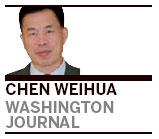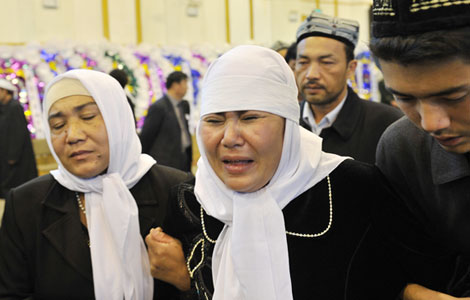Overlap of US, China interests on DPRK only goes so far
Updated: 2013-04-30 11:30
By Chen Weihua (China Daily)
|
||||||||

The tough talk and military posturing between the Democratic People's Republic of Korea and the United States following Pyongyang's nuclear test in February have subsided for now, but the issue appears far from being resolved.
Just three weeks after that Feb 12 test, the DPRK's third so far, the United Nations Security Council unanimously adopted Resolution 2094 condemning the test and imposing new sanctions.
China, which has close ties to the DPRK and provides it with fuel and food, has drawn particular attention for its unequivocal support of the council's resolution.
In short order, the then foreign minister Yang Jiechi summoned the DPRK ambassador to China to deliver a protest in stern language that Beijing hadn't used before.
Last week, the Transportation Ministry also did something unusual when it formally called for strict implementation of Resolution 2094.
"The Chinese are more serious than ever on UN resolutions regarding North Korea," Jin Canrong, a noted professor of international relations at Beijing's Renmin University, said at a seminar on Monday at the Carnegie Endowment for International Peace in Washington.
Changes in China's attitude have been seen publicly.
President Xi Jinping, speaking in early April at the Boao Forum for Asia, a high-profile policy forum in China, pointedly said that all nations, "big or small, strong or weak, rich or poor", should work to maintain and promote peace. He added: "No one should be allowed to throw a region and even the whole world into chaos for selfish gains."
Although Xi didn't specify the target of his remarks, most have interpreted them as being directed at the DPRK.
On China's popular microblogging service Sina Weibo, public attitudes toward the DPRK have also taken a dramatic shift in recent months. Many posters have lashed out at leader Kim Jong-un for what they see as irresponsible, belligerent behavior and a refusal to reform and open up as China has done since the late 1970s.
Gordon Flake, a specialist on Korean Peninsula matters and executive director of the Mansfield Foundation, said China's policy toward the DPRK is more nuanced than the impression some in Washington have that the US tries to sanction Pyongyang and China tries to block this.
Jin, of Renmin University, said changes in Chinese policy are tactical, not strategic. Fundamentally, Beijing hasn't shifted its stance on the DPRK.
Chinese leaders have repeatedly stated the principle of denuclearizing the Korean Peninsula, maintaining peace and resolving disputes through dialogue.
Zbigniew Brzezinski, a former US national security adviser, recently said he regards the current easing of rhetoric by the DPRK as the likely result of back-channel communication between Beijing and Pyongyang.
US Secretary of State John Kerry and General Martin Dempsey, chairman of the of the military's Joint Chiefs of Staff, visited Beijing last week to discuss the DPRK with Chinese officials, with apparently favorable results. Similarly received was last week's visit to Washington by Wu Dawei, China's special envoy to the Korean Peninsula and chairman of the suspended six-party talks in which the US, China, the DPRK, South Korea, Russia and Japan have tried to find a peaceful resolution to the nuclear standoff.
The US, after flying B-52 bombers and stealth fighter jets over the Korean Peninsula weeks ago, has begun to express interest in talks with the DPRK.
Pyongyang also said it's willing to negotiate, albeit with conditions the US finds unacceptable.
The DPRK has insisted that all UN sanctions be lifted, that the US and South Korea end their joint military drills, and that the US remove its nuclear-strike capability in the region. For its part, the US insists on Pyongyang's denuclearization as a prerequisite for any talks.
Although Washington is attempting to apply pressure on Beijing to do more to disarm the DPRK, many believe the revised stance in China is solely to further its own interests and not a response to American concerns.
Many in the US point out that China could effectively cause the DPRK to collapse if it were to cut off supplies of food and fuel. Chinese experts such as Jin and Peking University's Zhu Feng believe Beijing is unlikely to take such extreme measures, however.
Many Chinese remain distrustful of US intentions on the Korean Peninsula as well as Washington's strategic rebalancing in Asia. Many suspect the US has a hidden agenda to try to curtail China's emergence as a global power.
To Zhu, a grand bargain between China and the US to address each other's strategic concerns and core interests might encourage China to do more than it otherwise would with regard to the DRPK. But Flake and Paul Haenle, director of the Carnegie Endowment's affiliate office in Tsinghua, say such a deal is impossible because it would be to the disadvantage of US allies in the Asia-Pacific region.
China and the US are seeing more overlap of their interests with regard to the DPRK this time around, and Beijing's recent moves may slow down Pyongyang's nuclear progress. No one, however, believes these moves are certain to prevent the country from ultimately becoming a nuclear state.
Contact the writer at chenweihua@chinadailyusa.com
Most Viewed
Editor's Picks

|

|

|

|

|

|
Today's Top News
Three buried after lab explosion
Willem-Alexander ready to be Dutch King
Can earthquakes be predicted?
City unites to say farewell
Beauties turn entrepreneurs
Small stores rely on new retail revolution
Flooding season nears in Ya'an
Taobao creates job specifications
US Weekly

|

|














